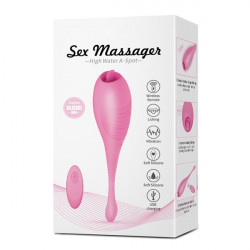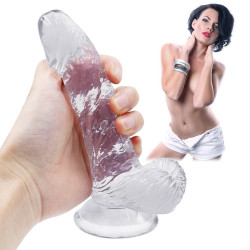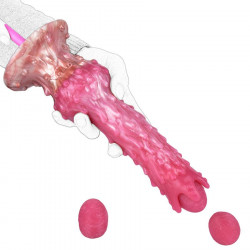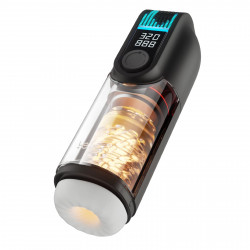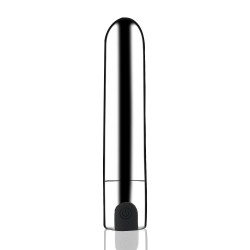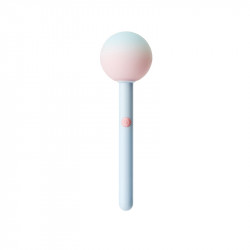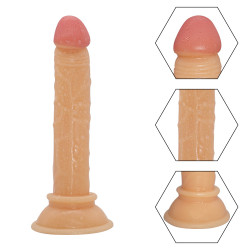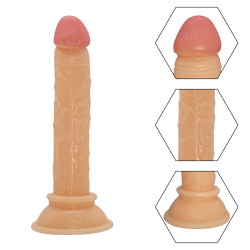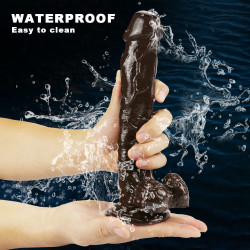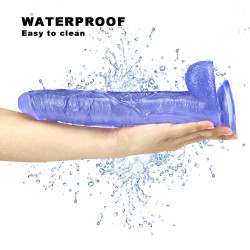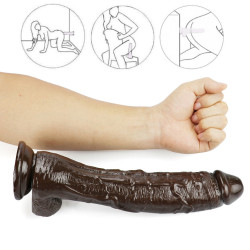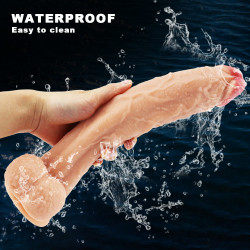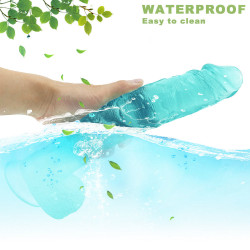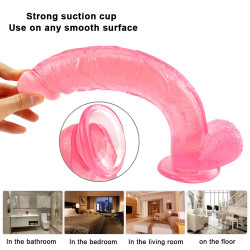Dildo Safety: Are TPE & PVC Dildos Safe?
Dildos have been crafted from glass, metal, stone, and wood over the years. As the industry developed and new materials were produced, the sex industry grew quickly. Dildos and other sex toys are made from a wide variety of materials.
TPE and PVC are two examples of the synthetic materials used to make dildos nowadays. The most crucial elements of cleaning and using TPE and PVC dildos correctly will be covered, along with the safety of using them.
What is a TPE dildo?
Thermoplastic elastomer, or TPE, is a substance that is safe for the body and has a wide range of industrial uses. We may therefore answer in the affirmative, although with some caution, if you're wondering if a TPE dildo is safe.TPE is stretchable, pliable, and soft. TPE is porous, though, which is not a desirable feature for sex toys. This substance is frequently used to make sex toys like dildos because it is typically latex and phthalate-free, making it safe for the body.
TPE dildos, which resemble a cross between silicone and jelly, are popular because they are soft, flexible, and bendable. The substance has good standards since it is considered non-toxic and safe. Like other sex toys, a TPE dildo should be lubricated; water-based lubrication is the ideal option.
The drawback of TPE is that material is porous, meaning that dangerous germs, fungi, or yeasts may grow in the tiny holes in the toy's surface. You must be quite diligent when cleaning your TPE dildo to guarantee its safety.A TPE dildo should always be cleaned completely, which typically entails using a lot of foamy toy cleanser and rinsing with warm water.
Possible TPE Dildo Issues
Since TPE cannot withstand high temperatures, sterilizing your TPE dildo by submerging it in hot water will cause it to melt. Because they can degrade the substance, alcohol and bleach are harmful to TPE. A TPE dildo can be cleaned with soap, but if you don't rinse it well enough, the soap may get stuck in the little pores and harm your delicate areas.
Although a TPE dildo is often waterproof and water-resistant, excessive wetness can lead to the growth of mold in the dildo's microscopic pores. Stop using your dildo and acquire a new one if you start to notice a scent.
In addition to being porous, TPE is not very resilient because it is readily destroyed on the surface. Color changes and black stains on the surface are indicators that your TPE dildo has been contaminated. In these situations, it's time to acquire a new toy and throw old one away.
Since silicone and TPE are both body-safe and have realistic-looking and feel properties, silicone dildos are the most widely used flexible material. Nonetheless, TPE toys are less costly due to its porous nature, and TPE dildos in particular need to be replaced after six to twelve months of use.
What is a PVC Dildo?
The chemical component known as polyvinyl chloride, or PVC, has several uses, including the production of sex toys. Its resilience, stability, and resemblance to actual skin make it useful. PVC, on the other hand, is not the most body-safe material for sex toys.
Manufacturers add phthalates and other compounds to PVC to make it softer, more flexible, and less brittle. Phthalates and related chemicals, however, are prohibited in many nations and are not the safest substances for the body.
A PVC dildo can be easily cleaned and sterilized, but its composition contains no harmful compounds that can be eliminated. Therefore, the easiest way to avoid dangerous chemicals coming into contact with your body is to use a condom when using your PVC dildo.
Silicone Dildos are a Better Alternative
However, we advise you to choose a dildo made of a body-safe substance, such as silicone, metal, or glass, to be truly safe. Silicone dildos are our preferred material because they are non-toxic, flexible, and safe for the body. They also don't smell.
We always advise you to examine the manufacturer's specifications and buy your sex toys from reliable manufacturers and merchants.
How to Recognize a Quality, Body-Safe Silicone Dildo?
Here's a way to find out what a dildo is composed of if you already own one. Try smelling the toy first; silicone doesn't smell, but PVC and TPE will smell like plastic and won't go away even after cleaning the dildo.
A silicone dildo feels velvety and smooth to the touch, and it doesn't become sticky when wet. Conversely, PVC feels smooth to the touch but becomes sticky when wet. TPE has a smooth, skin-like feel as well, but with continued use, it may become sticky.
A fire test provides conclusive evidence: silicone will heat up and char slightly, TPE will melt, and PVC will melt and burn, but these effects are cleanable and won't result in significant harm. In any event, always choose body-safe materials for your sex toys because nothing is worth risking your health for. You're in luck since we have a great store with a wide selection of vibrators, dildos, sex toys, and much more.
EVERY TIP YOU NEED TO MAKE YOUR BODY-SAFE DILDO
I want everyone who reads this to know that this article is appropriate for everyone before we begin. I am sure that what you are going to read will be the solution for your needs, regardless of whether you want to build a profitable side business or want to experience all the orgasms you desire. Yes, the world of do-it-yourself dildo may be confusing, especially if you don't know what you're doing. However, the few minutes to read this text would be enough to teach you everything you need to know. Therefore, don't go just yet.
I'll offer you three reasons why a dildo with a base is the only one that can be considered safe for use. Because a sex toy with a base can stand on its own, it may be put in a convenient location and yet look fantastic on your bedside table. Additionally, if you have a base, you won't have to worry about slipping your sex toy in, which may be risky, particularly if you're enjoying some anal action.
Did you know that you may find the ideal sex toy without having to travel to a store? You don't! With the correct prepackaged DIY kit, you can create your sex toy from scratch. I would suggest these do-it-yourself dildos for individual use, but not for widespread distribution. Making one for yourself and your pals is fantastic, but you can't develop it into a business because the quality of a do-it-yourself dildo doesn't quite match the requirements for mass production.
I will suggest Clone-a-Willy for do-it-yourself dildo kits because they are the greatest and most well-liked. You may create the ideal silicone copy of the greatest cock in the city with the aid of a kit like this. And believe me, this is uncommon. You are incredibly fortunate if you have ever used a dildo that was a great fit for you. Couples in long-distance relationships or those who must spend much time apart for any reason should consider this.
You can do more with the Clone-a-Willy kit than merely clone a dick. If there isn't a penis nearby to clone, you get to mold other toys. Additionally, there is a lovely selection of hues and natural skin tones. What's not to enjoy? You should be aware, though, that molding can be somewhat challenging.
The molding itself is the most challenging aspect of the procedure. Every procedure has a time limit. This implies that to obtain a mold-filled erection ready to go in two minutes, you must work with the clock during the mixing procedure. To achieve effective results, have a helper around. They do the mixing and other preparations; you do the erection.
The focus of this post is do-it-yourself dildos, and I will delve further into that topic. People frequently approach me with a ton of questions about do-it-yourself sex devices, and I'm always shocked by how ignorant they are. Therefore, I will respond to the frequently asked questions and more. Let's start by proving that do-it-yourself kits are inexpensive. Indeed! Yes, you read correctly. You don't need to drill into the Earth's core to obtain any ingredients required to make one. Gather your silicone mix, pigments, quick-set alginate, and water bottle for the tube.
Before we go any further, let me introduce you to Squarepegtoy's peg-away putty. With the help of this innovative device, you can create and modify silicone toys in various entertaining ways. This putty will instantly adapt to the platinum cure silicone you're using, allowing you to customize your dildos to your specifications. You need to exercise caution since any changes you make will be irreversible. Your silicone putty cannot be undone once it has hardened.
How to do the deed
Do you appreciate the task of creating a dildo from scratch, or is your primary concern the profit? If it's all about enterprise for you, I guarantee that with all the knowledge I'm about to produce, you can achieve quality comparable to what you see in traditional stores and earn more than the cost of fronting the firm.
Materials for getting
- Pigments
- Release 200 of Mann Ease
- Containers such as Legos, cartons, or plastic pitchers
- Sculpey
- Sticks and cups for your silicone mixture
- Silicone with Platinum Cure
You might need to add these tools to your arsenal if you want to reach the highest level possible:
- Pain reliever (pressure pot)
- Mod Podge
- Equipment for 3D printing
- compressor for air
- Pump and Chamber for Vacuum
Let's examine the ideal silicone for creating your do-it-yourself dildo. I advise using platinum cure silicone, and I can say the same for most subject matter experts. The best silicone is platinum-cure silicone. Regarding where to buy it, Smooth-On is the most well-known brand. However, I say this with some caution because, despite their popularity, some silicones harm your health. If you're going the business route with all this information, double-check silicones before investing your money in them.
The hardness must be taken into account when creating do-it-yourself sex toys. A Shore Durometer scale can be used to measure the hardness of your dildo. You need to keep an eye out for trapped bubbles in silicone that is tougher. Bubble sex gadgets aren't always ideal. If you want something hard but still somewhat soft, you might choose Dragon Skin; if you want something smooth, you might want to choose Ecoflex.
Let's examine a few characteristics.
Ecoflex
Ecoflex provides a range of 00-10, 00-20, and 00-30 hardness. What does this signify? It indicates that the likelihood of bubbles forming in your dildo after the procedure is finished is minimal. 00-10 suggests that, although you can use your dick as the outer layer of a dual-density toy, its softness will make it less suitable for implantation. For packers, masturbators, and long-depth devices, a range of 00–20 is ideal. It's also a nice choice for the outer layer of dual-density toys, and if you won't be soft enough to stand on your own or flop around, a 00-30 range—the toughest range, by the way—is a good option.
Dragon Skin
I'll tell you the inside scoop, but this specific silicon has multiple hardness qualities: The only ones worth attempting are 10 and 20A! If you're on a tight budget, you can still choose the 10A NV version even though you must set up pressure curing. It compensates for vacuum degassing with its low viscosity.
This is how the 10 A and 20 A differ from one another. While the latter is excellent for dual-density cores and g-spot toys, the former provides a variety of cure times and pot lifetimes suitable for brutal dildos and dual-density cores.
How to Sculpt Your DIY Dildo
This can be accomplished in several ways. When it comes to forming dildos, my personal favorite is the Sculpey tool. After shaping and baking, it only needs to be allowed to cool. Mod Podge can make your finished piece smoother if you want to go all pro. Coat your sculpture from top to bottom with a brush or fingertips, then let it dry.
This dick stuff is more complicated than it first appears. Do you know what 3D dildos are? You have now! You can use fantastic software like Blender, ZBrush, or 3D Studio Max to model this dildo. Blender is an excellent substitute for Zbrush if you can't buy it, even if Zbrush offers you some lovely organic shapes. A dildo generator is a simple solution if you would rather not deal with all the hassle. You will not have as much control over your invention as you would like, but it is the only drawback. All things considered, if you choose to go the 3D route, these are excellent options. Just print after modeling!
Making Your Silicone Mold
The first step in this method is to have a proper molding media. Because of its ease of usage and quick curing time, I prefer to use Smooth-On's Mold Star 16 Fast. With this mold, I also don't have to worry about degassing. The next step is to get a container to keep your mold in while it cures. Seek out smooth, airtight containers such as water bottles or cartons. Don't use just any container; it must be able to hold viscous substances.
The Molding Procedure
Putting your sculpted dick at the bottom of the container you're using is the first step. If you would like, you can apply some Mann Ease Release 200 to your sculpture and the walls of the container. This ensures your silicone doesn't adhere to the container or the model. The molding media must then be mixed rapidly and uniformly to avoid exceeding the pot life limit. Avoid going overboard because the outcome will be very different from what you had in mind.
Once everything is well combined, cover your product with a thin layer of silicone while holding your hands as high as you can without stumbling. Continue pouring until your cast is fully formed, and then let it cure.
Coloring Your Silicone
To color your silicone, you must purchase amazing pigments, such as Smooth-On's Silc Pig. You can get any hue you want with other available inexpensive sampler kits. Glow Worm is an exceptional product from Smooth-On that comes in blue and green and makes your dildo glow in the dark for a little extra kink.
The Cosmetic Mica is an additional intriguing choice. You can select from a fantastic array of colors and sparkles. You must watch what you buy because not all mica suits internal usage.
Mixing Your Colors
The only explanation I can think of is that creating your dildos involves a lot of color mixing, much like creating ordinary paint. I paint part A of my sculptures using pigments to ensure an uninterrupted mixture of the two parts and give me more time to color my silicone. I frequently look to Vimeo for inspiration, particularly regarding gradients, marbled designs, and other ornamental elements.
Make sure to perform extensive degassing to eliminate bubbles if you're using a high-viscosity silicone and doing this as a business.
Pouring Your Silicone into Your Mold
Pouring your mold is a lot like this last step. The one distinction is that Mann Ease Release 200 must now be sprayed into your mold beforehand. If you don't do this, the two silicones will become stuck together, making it impossible to create a new one.
To complete this final stage, follow my instructions for pouring your mold. This time, however, the silicone mold is being filled with liquid. After completing this, either place your dildo in a pressure chamber set to 40 PSI or whatever PSI is necessary for the silicone you are using, or leave it outside to cure.
The final step is carefully removing it, washing it with a strong detergent, and voilà! You've cleaned and prepared your homemade dildo so you can enjoy yourself.



